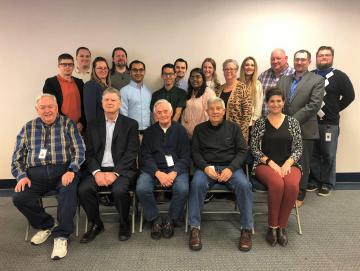
By Marielle Walter, Common Impact staff
Over the course of six-months, The Partnership for Successful Living and a volunteer team from Fidelity Investments joined forces to develop a new IT infrastructure roadmap for the organization.
The Partnership for Successful Living (PSL) is a collaboration between six New Hampshire nonprofit agencies that banded together to form an innovative network to help New Hampshire families and individuals solve many of life’s most challenging issues and gain sustainable independence. Among the many services that these agencies provide are substance use disorder treatment, veterans services, primary and preventative healthcare, HIV/AIDS services, health care for the elderly and disabled, affordable housing, training and workforce development and mental health treatment. Together, these organizations serve over 5,000 New Hampshire community members each year.
While each of the partnership members is a separate legal entity with its own 501(c)(3) status, mission, budget and staff, they share back-end resources. PSL operates 22 sites under the same domain and members rely on shared infrastructure, use many of the same tools and receive IT training, support, repair and inventory from the same IT department.
The Partnership
The PSL IT team approached Common Impact with a desire to think more strategically about how to invest in and leverage technology systems that would best support the complex, distributed organization. Common Impact worked with partners at Fidelity Investments to scope and launch a project with a team of eight volunteers from Fidelity’s Enterprise Infrastructure department. The team was tasked with assessing PSL’s current IT infrastructure and developing a strategic IT roadmap.
The Fidelity team members were recruited from LEAP, Fidelity’s technical talent development program for recent college graduates pursuing careers in technology. Employees in the LEAP program join Common Impact projects to support their community as well as to build their own technology expertise, innovative thinking, communication and complex problem-solving skills.
The Project
The team began the project with an internal IT infrastructure assessment, reviewing all hardware and software and interviewing the leadership of the agencies within PSL to ensure all technology needs and challenges were documented. The team then identified and prioritized needs, performed research, conducted vendor comparisons and reviewed industry best practices. Being mindful of the context and constraints of the nonprofit operating environment, the team made technology recommendations and crafted a strategic roadmap to guide PSL’s IT investment and growth. The development of this roadmap included a strategic budgeting activity where the Fidelity team developed an IT budget to support the future sustainability and success of the IT department and the organization as a whole.
The Impact
The final roadmap was presented to senior leadership and board members. PSL’s CEO recognized the impact the projected outcomes would have in advancing the organization’s operational goals and expressed the intention to quickly implement the recommendations. Assistant Director of Technology Neil Tozier, who worked closely with the Fidelity team, shared, “Having the Fidelity group to interact with gave us the opportunity to grow as technology professionals. This has left a lasting impact. This project is a bright light on us.”
Members of the Fidelity volunteer team also shared the significant impact the project had on them personally and professionally. Many voiced how rewarding it was to work with a nonprofit organization and see it grow through the course of the collaboration. Volunteers also expressed significant gains in technology, project management and other key professional skills. Volunteer team member Bret Stagnone, a Data Engineer at Fidelity, shared, “I was able to learn from others in Fidelity as well as the nonprofit. This was a good way to expand my knowledge.”
Within 6 months of the project wrap, PSL reported making significant progress implementing the new IT roadmap. To date, the plan has been used to revise budgets, hire two new staff members and purchase additional licenses to support more end users. PSL has also increased their number of VPN users and had better utilization of remote employees.
This project was not the first that PSL tackled with Common Impact and Fidelity. In 2016, a Fidelity team worked to transition PSL to SharePoint. PSL’s commitment to enhancing their IT infrastructure, as well as their long-term partnership with Common Impact and Fidelity, will support them well as they work to develop a robust, strategic and sustainable IT department.


